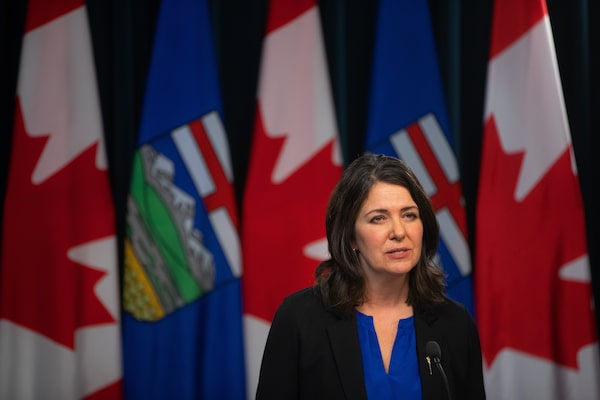
Alberta Premier Danielle Smith speaks at a news conference after the Speech from the Throne in Edmonton, on Nov. 29.JASON FRANSON/The Canadian Press
Alberta Premier Danielle Smith introduced her proposed sovereignty act on Tuesday, a bill that would give her cabinet far greater powers than she promised, including the ability to rewrite laws and order government agencies, police, cities and universities to disregard federal legislation the Alberta government believes is unconstitutional or harmful to the province.
After she unveiled the bill, Jason Kenney, her predecessor as United Conservative Party leader and premier, resigned from his seat in the legislature. The act fulfills a pledge Ms. Smith made during her leadership bid, when she campaigned on defending Alberta’s interests against a meddling Ottawa.
Alberta’s proposed law, formally titled the Alberta Sovereignty Within a United Canada Act, would give the provincial cabinet powers akin to those available in emergency situations, such as the ability to amend legislation by order in council, rather than going through the assembly. The cabinet would also be able to issue “directives” to provincial entities, including municipal and regional police forces and RCMP under provincial contract, ordering them not to enforce specific federal laws or policies.
The bill would allow the legislature to identify federal measures – including proposals that have not yet been enacted – that are unconstitutional or “harmful” to Alberta. The act does not define what constitutes harm.
Legal scholars previously panned the concept of the sovereignty act as unconstitutional, and it has been divisive within the UCP. Mr. Kenney, along with most of Ms. Smith’s leadership rivals, condemned the idea during this year’s leadership campaign. All but one of her leadership challengers are now in cabinet.
“We need the power to reset the relationship with Ottawa,” Ms. Smith told reporters when asked why the government is empowering cabinet to bypass the assembly. “You don’t have that relationship change without a push. This is a push.”
Ms. Smith has instructed provincial cabinet ministers to comb federal legislation for instances of policies they believe interfere with Alberta’s constitutional jurisdiction, infringe on Albertans’ Charter rights or are harmful to Albertans. She has ordered ministers to prepare special resolutions under the proposed sovereignty act, for debate in the spring.
She claimed on Tuesday that she does not want to trigger the legislation once it comes into force.
“I hope we never have to use this bill. I hope that we sent a message to Ottawa that we will vigorously defend our constitutional areas of jurisdiction and they should just butt out,” Ms. Smith said.
Eric M. Adams: The constitutional confusions of a sovereignty act
Prime Minister Justin Trudeau, prior to the release of the act’s text on Tuesday, told reporters that he doesn’t see the proposed legislation as a priority for Albertans. “I’m going to stay focused on the things that matter,” he said, before listing affordability, job creation and addressing climate change. “That’s what Albertans are focused on.”
Dominic LeBlanc, the federal Minister of Intergovernmental Affairs, said Ottawa has a constructive and positive relationship with Alberta. He said there are disagreements among levels of government from time to time, but that Canada remains united.
“Provincial governments can table legislation in their own legislatures. They can debate and adopt that legislation. We’ll do the same thing in the Parliament of Canada,” he said. “But we’re not going to get distracted from working on positive things with all the provincial governments.”
Alberta’s New Democratic Party MLAs all voted against the first reading of the sovereignty act. Sarah Hoffman, the NDP Deputy House Leader, told reporters the powers the act would give Ms. Smith and her cabinet are “dictatorial, unconstitutional and undemocratic.” She called UCP members who were critical of the sovereignty act prior to Ms. Smith ascending to power “spineless” for walking back their opposition.
“We see a UCP consumed with clinging to power rather than helping people,” she said. “We will continue to oppose the sovereignty act and all of the chaos that it’s creating for our economy.”
Ms. Smith argued the Canadian constitution renders the federal and provincial governments equals.
The Premier has specifically asked provincial ministers to review federal policies that seek to “regulate and control Alberta’s natural resources and economic development”; “penalize” the province’s energy and agriculture sectors; “control” the delivery of health care, education and other social programs by attaching conditions to funding; “confiscate” legally owned firearms or otherwise interfere with private property rights; violate the Charter rights of Albertans; or “violate other sovereign areas of exclusive provincial jurisdiction.”
To trigger the act, the Premier or a minister must introduce a motion identifying a federal policy, the alleged harm and the proposed measures for cabinet to consider. If such a motion passes, cabinet can then direct a minister to exercise their legislative or regulatory powers, give directives to provincial entities, amend enactments or perform other unidentified actions.
While the legislation gives the province power to issue directives to entities such as municipalities and Crown corporations, there is nothing in the bill that addresses what happens if such a body disregards an order. The directives, the government noted, must be within Alberta’s constitutional jurisdiction.
Saskatchewan earlier this month introduced the Saskatchewan First Act, with the goal of asserting provincial jurisdiction over its natural resources. That act established a tribunal to determine if a federal measure is harmful or constitutionally offside, whereas Alberta’s act delegates that authority to MLAs.
Indigenous leaders in Alberta and Saskatchewan have opposed those provinces’ proposals. The Alberta government said in a fact sheet distributed to reporters on Tuesday that Ms. Smith has committed to meeting with First Nations leaders within the province’s borders to “ensure the Chiefs of the government’s commitment to upholding the rights of Indigenous Peoples under the Canadian Constitution.”
The chiefs in Treaty Six confirmed Tuesday evening they were unanimous in their opposition to Ms. Smith’s proposal. In a statement, the chiefs declared the bill “self-centred” and “short-sighted” and said the lack of consultation prior to its introduction suggests reconciliation with Indigenous peoples is not a priority for Ms. Smith or the UCP. They said they also worry the act could be used to ignore treaties, despite the government’s assurances to the contrary.
The government said it believes the proposed law can withstand a constitutional challenge, but noted “the constitutionality of each resolution brought under the act will have to be carefully drafted and reviewed on a case-by-case basis to ensure the resolutions are constitutionally defensible.”
 Carrie Tait
Carrie Tait Alanna Smith
Alanna Smith